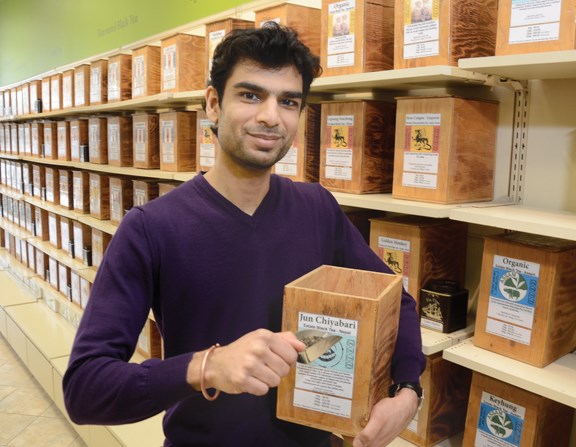Over a cup of delicate and grassy Nepalese Jun Chiyabari tea, Kanak Tanna speaks to me of her childhood on a tea plantation in Uganda.
“We used to run through the fields plucking the tea leaves,” recounts Kanak. “We’d eat them there, just like that. This was before people really talked about those plants, about what benefits they have.”
Kanak is now the matriarch of the Tanna family, owners and operators of the long-standing Tea Time shop on Lonsdale Avenue. Her son, Akshai Tanna, is the shop’s principal, having taken the reigns a few years back from his father, Jitendra, who still mans the fort the odd Saturday to give his son a break from the demands of a thriving retail business.
The Tanna family history is steeped in tea. Akshai’s grandparents were tea agents in Western India, importing high quality black teas from Assam, a famed growing region in India’s extreme Northeast, flanked by Bangladesh and Bhutan. The entrepreneurs relocated their family first to Africa and eventually to Europe, settling in the U.K.
Thirteen years ago, Jitendra moved his family to Canada and soon discovered that finding a good cup of tea in this country was not a simple undertaking. Leveraging familial supplier relationships from India, the Tannas began importing exceptional teas from select estates in Assam and other key growing regions.
Out of this quest for a quality cup, Tea Time was born in 2001.
The shop sells loose teas and a thoughtful collection of tea paraphernalia, from infusers and pots to the uniquely gourd-like vessels traditionally used to prepare and drink Yerba mate, a bitter tea hailing from South America.
Absent at Tea Time is a bustling service bar with tea baristas concocting café-inspired beverages, like the now-ubiquitous red tea latté or Earl Grey misto. For the Tannas, there is elegance, refinement, and, ultimately, satisfaction to be found in the simplicity of pure, high-quality tea.
The bells and whistles introduced by the new wave of tea-centric retailers that can command $5 for a 12-ounce, tea-infused beverage are simply not part of the Tea Time paradigm.
“We’re about keeping tea accessible, at just pennies a cup,” says Jitendra, noting that many teas of the green, red, and herbal variety can be re-steeped several times over to offer exceptional value for the investment.
All of the teas sold at Tea Time are responsibly produced, meaning that families working on the tea plantations that supply the shop are fairly compensated for their labour. Flavoured teas, of which Tea Time sells many, are produced without the use of artificial ingredients or chemically extracted flavours. Akshai pulls a wooden box of marzipan-flavoured rooibos from a shelf to illustrate the point.
Unfurling the bag inside, the concentrated and perfumed scent of almonds immediately fills the air. The brick-red fibres of the tea (properly a tisane, or herbal tea) are accented by toasted almond slivers and small, delicious nuggets of marzipan. When steeped, the mixture yields a deep orange liquor with a complexly herbaceous initial flavour that soon gives way to luxurious notes of nutty confection.
The combined tea knowledge of the Tanna family is staggering; each of them can wax lyrical about the products in their shop, about contemporary methods of production, about the traditions that accompany teas from various regions of the globe, and yet there is a notable lack of pretention in the sharing of this information.
For example, at one point in my visit I asked Akshai to name the most exclusive tea for sale in the shop, expecting him to perhaps pull their rare Gyokuro green tea from the shelf and remark on its tightly regulated, shade grown pedigree and traditionally hefty pricetag.
Instead, my question is met with a quizzical look and a request for clarification. I realize later that my query must have seemed absurd to someone who has made significant efforts to provide nothing but the world’s best teas, painstakingly sourced, vetted for responsible practices, and priced in a way that respects tea’s historical accessibility.
The short answer to my question is, of course, that all of these teas are exclusive, each offering a satisfying cup in its own right. Rare, storied teas are available here, to be sure; a Keemun from the Chinese province of Anhui boasts tiny, perfectly symmetrical, hand-sorted leaves that impart the subtlest notes of orchid.
But Akshai introduces me instead to Tea Time’s Earl Grey Cream, one of the shop’s best sellers. The familiar, citrusy notes of Earl Grey’s defining bergamot component support mouth-watering undertones of vanilla and caramel. The brew is at once opulent and accessible, exotic and yet strangely familiar. It is also only $6.50 for a 50-gram bag, which will yield dozens of cups of tea.
Time to put the kettle on.
Tea Time is located at 1418 Lonsdale Ave. in North Vancouver. 604-990-1414
Chris Dagenais served as a manager for several restaurants downtown and on the North Shore. A self-described wine fanatic, he earned his sommelier diploma in 2001. Contact: [email protected].



